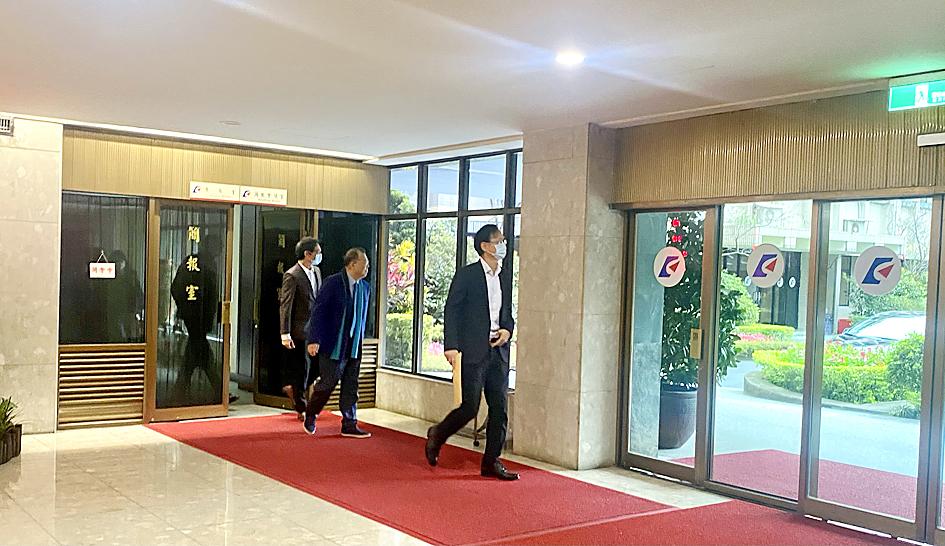As automakers around the world face work stoppages due to a lack of chips, Taiwan’s leading chipmakers will “do their best” to “squeeze out more chips” for the global auto industry, Minister of Economic Affairs Wang Mei-hua (王美花) said yesterday after a lunch meeting with company representatives.
Speaking after meeting with representatives of Taiwan Semiconductor Manufacturing Co (TSMC, 台積電), United Microelectronics Corp (UMC, 聯電), Vanguard International Semiconductor Corp (世界先進) and Powerchip Semiconductor Manufacturing Co (力積電), Wang said that chipmakers agreed to help “as much as they can,” but added that it would not be easy.
“Their production lines are already full or even overloaded right now, but [they understand that the] auto chip shortage is threatening the whole global auto supply chain,” Wang said. “Jobs are on the line.”

Photo: Huang Pei-chun, Taipei Times
Taiwanese chipmakers will try and optimize their production lines to go from “100 to 102 or 103 percent capacity,” and allocate the extra capacity for automakers, she said.
Chipmakers have also committed to giving auto chips the highest support rate, and to talk to their other customers to see if they are willing to accept a reduction or delay in orders, freeing up capacity for auto chips, she said.
Taiwanese chipmakers are part of the auto industry’s supply chain, manufacturing chips on a contract basis for auto chip designers, which sell them to auto components and vehicle manufacturers, Wang said.
Amid the COVID-19-induced global slowdown, customers slashed orders for auto chips, while demand for chips for information and communications technology and 5G applications soared, she said.
By the time auto demand came roaring back, Taiwanese foundries were already working at full capacity, she added.
“Chipmakers warned customers at the time that if they continued to cut auto chip orders, it would be hard to meet those orders when they return,” she said.
Wang confirmed that European, US and Japanese representatives went through diplomatic channels to ask for the ministry’s help on behalf of their automakers.
“Today was a good start, but this is going to be a longer-term problem,” Wang said, “It is all we can do right now to squeeze out some extra capacity as demand exceeds supply.”
“Our chipmakers are taking the impact [of the auto chip shortage] into account, but they have a duty to fulfill their existing contracts,” she said.
Nikkei Asia on Tuesday reported that Taiwanese chipmakers are mulling “another round of price increases, mainly in auto chips.”

With an approval rating of just two percent, Peruvian President Dina Boluarte might be the world’s most unpopular leader, according to pollsters. Protests greeted her rise to power 29 months ago, and have marked her entire term — joined by assorted scandals, investigations, controversies and a surge in gang violence. The 63-year-old is the target of a dozen probes, including for her alleged failure to declare gifts of luxury jewels and watches, a scandal inevitably dubbed “Rolexgate.” She is also under the microscope for a two-week undeclared absence for nose surgery — which she insists was medical, not cosmetic — and is

CAUTIOUS RECOVERY: While the manufacturing sector returned to growth amid the US-China trade truce, firms remain wary as uncertainty clouds the outlook, the CIER said The local manufacturing sector returned to expansion last month, as the official purchasing managers’ index (PMI) rose 2.1 points to 51.0, driven by a temporary easing in US-China trade tensions, the Chung-Hua Institution for Economic Research (CIER, 中華經濟研究院) said yesterday. The PMI gauges the health of the manufacturing industry, with readings above 50 indicating expansion and those below 50 signaling contraction. “Firms are not as pessimistic as they were in April, but they remain far from optimistic,” CIER president Lien Hsien-ming (連賢明) said at a news conference. The full impact of US tariff decisions is unlikely to become clear until later this month

GROWING CONCERN: Some senior Trump administration officials opposed the UAE expansion over fears that another TSMC project could jeopardize its US investment Taiwan Semiconductor Manufacturing Co (TSMC, 台積電) is evaluating building an advanced production facility in the United Arab Emirates (UAE) and has discussed the possibility with officials in US President Donald Trump’s administration, people familiar with the matter said, in a potentially major bet on the Middle East that would only come to fruition with Washington’s approval. The company has had multiple meetings in the past few months with US Special Envoy to the Middle East Steve Witkoff and officials from MGX, an influential investment vehicle overseen by the UAE president’s brother, the people said. The conversations are a continuation of talks that

CHIP DUTIES: TSMC said it voiced its concerns to Washington about tariffs, telling the US commerce department that it wants ‘fair treatment’ to protect its competitiveness Taiwan Semiconductor Manufacturing Co (TSMC, 台積電) yesterday reiterated robust business prospects for this year as strong artificial intelligence (AI) chip demand from Nvidia Corp and other customers would absorb the impacts of US tariffs. “The impact of tariffs would be indirect, as the custom tax is the importers’ responsibility, not the exporters,” TSMC chairman and chief executive officer C.C. Wei (魏哲家) said at the chipmaker’s annual shareholders’ meeting in Hsinchu City. TSMC’s business could be affected if people become reluctant to buy electronics due to inflated prices, Wei said. In addition, the chipmaker has voiced its concern to the US Department of Commerce